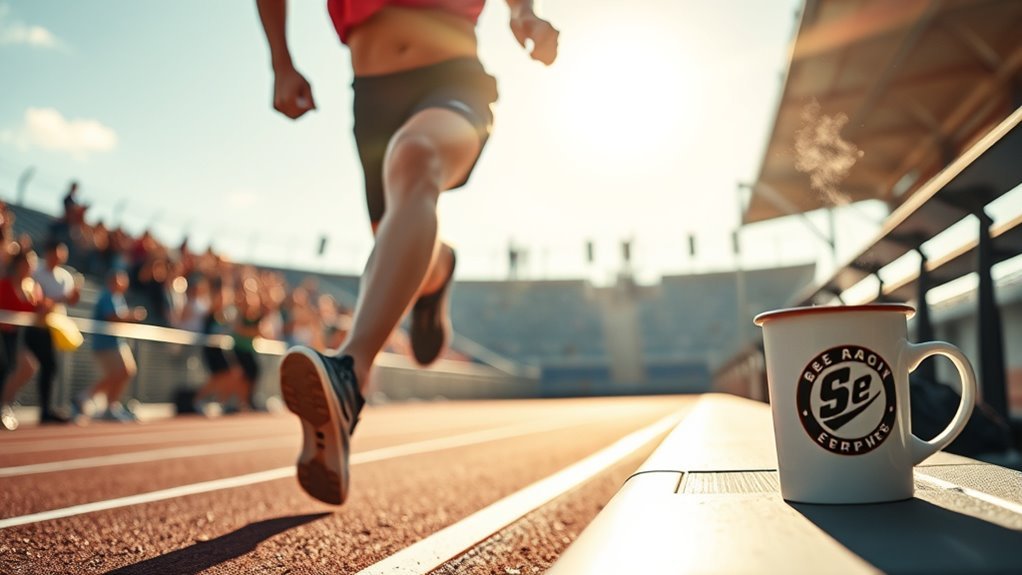The Benefits of Coffee for Professional Athletes
Coffee offers professional athletes several benefits that can enhance performance. It boosts endurance by delaying fatigue and reducing perceived effort during workouts. You’ll also experience improved focus, thanks to increased dopamine production, which sharpens decision-making. Additionally, coffee aids recovery by replenishing glycogen levels post-exercise. Moderate consumption supports hydration, countering any potential diuretic effects. Understanding your caffeine tolerance is essential for maximizing these advantages. Discover how to personalize your coffee intake for peak performance and more potential benefits next.
Understanding Caffeine and Athletic Performance

While many athletes rely on various supplements to enhance their performance, caffeine stands out as one of the most researched and effective ergogenic aids available. Caffeine’s ability to improve athletic performance primarily hinges on its influence on caffeine metabolism and energy pathways. When you consume caffeine, it gets rapidly absorbed and metabolized, leading to increased adrenaline levels. This stimulates your body to tap into fat stores for energy, sparing glycogen reserves during prolonged exercise. Additionally, caffeine enhances the efficiency of the central nervous system, reducing perceived exertion and improving focus. Understanding how caffeine interacts with your body’s energy pathways can empower you to optimize your performance naturally, giving you the freedom to push your limits and maximize your training outcomes.
Improved Endurance: How Coffee Can Boost Your Stamina
Caffeine’s impact on energy metabolism not only enhances immediate performance but also plays a significant role in improving endurance. For athletes like you, coffee benefits extend beyond a quick pick-me-up; it can provide a substantial stamina boost during prolonged activities. Studies show that caffeine consumption can delay fatigue, allowing you to push through those last challenging moments.
| Coffee Benefits | Stamina Boost | Key Takeaway |
|---|---|---|
| Increases endurance | Enhances performance | Delays fatigue |
| Improves focus | Sustains energy | Supports stamina |
| Reduces perceived effort | Promotes longer workouts | Elevates mood |
Enhanced Focus and Mental Clarity

Many athletes find that coffee considerably enhances focus and mental clarity during training and competition. This cognitive enhancement stems from caffeine’s ability to increase dopamine production, leading to improved attention and quicker decision-making. When you consume coffee, you’re not just boosting your energy; you’re also sharpening your mental endurance. Studies indicate that caffeine can reduce the perception of fatigue, allowing you to maintain concentrated efforts for longer periods. This mental clarity is essential in high-stakes situations, where split-second decisions can make all the difference. By incorporating coffee into your routine, you can achieve a sharper mind and greater performance consistency, making it an invaluable tool for athletes seeking that competitive edge.
The Role of Antioxidants in Recovery
Since oxidative stress can occur during intense physical activity, the role of antioxidants in recovery becomes essential for athletes. Antioxidants, like those found in coffee, help combat free radicals that can damage cells and hinder your recovery process. By reducing oxidative stress, you can enhance muscle repair and decrease inflammation, leading to more effective recovery optimization. Research shows that coffee’s antioxidant benefits not only protect your body but can also improve endurance and performance. Incorporating coffee into your post-workout routine may allow you to bounce back faster, giving you the freedom to train harder and achieve your goals. Embracing these antioxidant properties can be a game-changer in how you recover, ensuring you’re always ready for your next challenge.
Timing Your Coffee Consumption for Optimal Results

When it comes to maximizing the benefits of coffee for athletic performance, timing your consumption can make a significant difference. For ideal results, consider incorporating coffee into your pre-workout rituals about 30 to 60 minutes before training. Research shows that caffeine enhances endurance and reduces perceived exertion, allowing you to push harder during workouts. Additionally, using coffee strategically in your recovery strategies can be beneficial. Consuming it after exercise may aid in glycogen replenishment, especially when paired with carbohydrates. Just be mindful of your overall caffeine intake, as too much can disrupt sleep and recovery. By thoughtfully timing your coffee consumption, you can harness its potent benefits, empowering your athletic journey.
Coffee as a Pre-Workout Supplement
As you gear up for a workout, incorporating coffee as a pre-workout supplement can greatly enhance your performance. The caffeine in coffee acts as a powerful stimulant, increasing endurance and reducing perceived exertion. This means you’ll push harder and longer, ultimately improving your workout results. The ideal coffee preparation involves brewing it strong, ensuring you extract the maximum caffeine content. Different caffeine sources, like espresso or cold brew, can also provide varied effects, so experiment to find what works best for you. Aim to consume your coffee about 30-60 minutes before exercising to allow the caffeine to kick in. With proper timing and preparation, coffee can become an essential part of your fitness routine, helping you achieve your athletic goals.
Debunking Common Myths About Coffee and Athleticism

While many athletes have embraced coffee for its performance benefits, several myths persist that can cloud its reputation. Let’s debunk some common coffee misconceptions and caffeine myths that might be holding you back:
Many athletes overlook coffee’s performance benefits due to persistent myths. Let’s clarify the truths about caffeine and coffee.
- Coffee dehydrates you: Research shows moderate coffee consumption doesn’t lead to dehydration; it can actually contribute to your fluid intake.
- Caffeine is a performance killer: In reality, caffeine can enhance endurance and focus, helping you push through tough workouts.
- Only dark roasts matter: All types of coffee contain beneficial compounds; the key is finding what works best for you.
The Impact of Coffee on Hydration Levels
When you consume coffee, it’s vital to understand how caffeine affects your fluid balance. While some studies suggest that caffeine can have a diuretic effect, recent research indicates that moderate coffee consumption doesn’t greatly impair hydration levels. Timing your intake before or after workouts can also influence how your body manages fluids.
Caffeine and Fluid Balance
Although many athletes worry about caffeine’s potential to dehydrate, research suggests that moderate coffee consumption can actually support hydration levels. Here’s how coffee fits into your hydration strategies:
- Caffeine absorption: When consumed in moderation, coffee can enhance fluid retention and balance.
- Hydration levels: Studies indicate that coffee contributes to your daily fluid intake, keeping you adequately hydrated.
- Performance benefits: Staying hydrated with coffee can improve endurance and reduce fatigue during workouts.
Diuretic Effects Examined
Despite common concerns about coffee’s diuretic effects, research shows that its impact on hydration levels might be less significant than previously thought. Many athletes worry that coffee could hinder their hydration strategies, but studies indicate that moderate coffee consumption doesn’t lead to dehydration.
| Diuretic Impact | Hydration Strategy |
|---|---|
| Minimal effect | Balanced intake of fluids |
| Caffeine tolerance | Include electrolytes in hydration |
| Individual variation | Monitor personal hydration levels |
Incorporating coffee into your routine can actually support performance without compromising hydration. Understanding its diuretic impact is essential, but staying mindful of your overall fluid intake guarantees you maintain peak hydration, even when enjoying your favorite brew.
Timing of Consumption
Understanding how coffee fits into an athlete’s hydration strategy goes beyond just its diuretic effects; timing plays a pivotal role as well. When consumed strategically, coffee can enhance performance without compromising hydration.
- Pre workout timing: Having coffee about 30-60 minutes before exercise can boost energy and focus, helping you maximize your performance.
- During workouts: Sipping on coffee can maintain energy levels, but be cautious of overconsumption, as it may lead to dehydration.
- Post workout recovery: After your workout, coffee paired with water can aid in replenishing fluids and promoting muscle recovery.
Personalizing Your Coffee Intake for Peak Performance
To maximize your athletic performance, it’s essential to personalize your coffee intake by focusing on ideal timing and tailored caffeine dosage. Research shows that consuming caffeine about 30 to 60 minutes before exercise can enhance endurance and focus. Additionally, understanding your individual tolerance to caffeine allows you to find the perfect amount that boosts your performance without causing jitters or crashes.
Optimal Timing Strategies
While many athletes rely on coffee for its performance-enhancing benefits, the timing of your caffeine intake can greatly influence its effectiveness. To maximize your coffee rituals, consider these ideal caffeine timing strategies:
- Pre-workout boost: Consume coffee about 30-60 minutes before your training session to enhance endurance and focus.
- Mid-session pick-me-up: If your workout exceeds an hour, a small coffee sip can sustain energy levels and mental clarity.
- Post-workout recovery: Enjoy a cup after intense training to help with muscle recovery while replenishing glycogen levels.
Tailored Caffeine Dosage
Finding the right caffeine dosage can greatly impact your athletic performance and overall training experience. Individual caffeine sensitivity varies, so understanding your personal threshold is key. Research suggests that a dosage of 3-6 mg of caffeine per kilogram of body weight can enhance endurance and focus. However, if you’re sensitive to caffeine, you might need to make dosage adjustments to avoid jitters or disruptions in sleep. Experimenting with different amounts before workouts can help you identify the most effective intake. Monitoring your body’s response allows you to fine-tune your caffeine strategy, ensuring you harness its benefits without overdoing it. By personalizing your coffee intake, you’ll optimize performance and enjoy the freedom to train at your best.
Success Stories: Athletes Who Swear by Coffee

Many elite athletes incorporate coffee into their training regimen, believing it enhances performance. You might be surprised to learn how many champions swear by their coffee rituals, sharing athlete testimonials that highlight its benefits. Here are a few key insights:
- Increased Endurance: Many report improved stamina during long workouts.
- Enhanced Focus: Coffee helps sharpen mental clarity, essential for high-stakes competitions.
- Faster Recovery: Some athletes experience quicker recovery times when consuming coffee post-training.
These success stories show that coffee isn’t just a beverage; it’s a performance-enhancing tool. Whether you’re an aspiring athlete or a weekend warrior, integrating coffee into your routine could reveal your potential and elevate your game. So, why not explore what it can do for you?
Frequently Asked Questions
Can Coffee Enhance Strength Training Performance for Athletes?
You might wonder if coffee can enhance your strength training performance. Research suggests that caffeine can improve strength endurance, especially when consumed strategically. Timing your caffeine intake about 30 to 60 minutes before a workout may maximize its effects, allowing you to push harder and longer. This boost can lead to better performance in strength training sessions, helping you reach new personal bests and achieve your fitness goals more effectively.
Is Decaffeinated Coffee Beneficial for Athletes?
Is decaffeinated coffee beneficial for you? While it lacks caffeine’s stimulating effects, it offers unique decaf benefits. Rich in antioxidants, decaf can help reduce inflammation and support recovery. It’s a great caffeine alternative for those sensitive to stimulants or who prefer to avoid jitters. Plus, it still provides the comforting taste of coffee, allowing you to enjoy your favorite brew without compromising your performance. Embrace the balance between taste and health with decaf!
How Does Coffee Affect Sleep Quality in Athletes?
You might find that coffee can disrupt sleep quality, especially if consumed too close to bedtime. Caffeine affects your sleep cycles by delaying the onset of deep sleep and reducing overall sleep duration. For ideal rest, it’s essential to evaluate caffeine timing; having coffee earlier in the day can minimize its impact on your nighttime sleep. Balancing your intake can help you maintain energy levels without sacrificing the quality of your sleep.
Are There Negative Side Effects of Coffee for Athletes?
Imagine coffee as a double-edged sword in your athletic journey. While it can enhance performance, it can also lead to negative side effects. You might experience an increased heart rate, which could impact your endurance. Additionally, coffee can elevate the risk of dehydration, especially if you’re not compensating with water. It’s essential to weigh these potential downsides against the benefits, ensuring your body stays in prime condition for peak performance.
Can Coffee Consumption Lead to Dependency in Athletes?
Yes, coffee consumption can lead to dependency in athletes. As you regularly consume caffeine, you might experience tolerance development, requiring more to achieve the same effects. If you suddenly stop drinking coffee, you could face withdrawal symptoms like headaches, fatigue, and irritability. This dependency can hinder your overall performance and well-being, so it is important to monitor your intake and consider balancing your caffeine consumption with other strategies for energy and focus.






